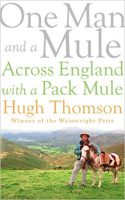 Among books I’m reading at the moment is One Man and a Mule by Hugh Thomson (Preface). The title’s a little economical with the truth, as the author has human company much of the way, and the mule’s a bit of a contrivance, given that it shoulders less baggage than its master, but the book is still a companionable account of a coast-to-coast walk across England, from the Lake District to the Yorkshire Moors. (Since writing this post, I’ve done a review.)
Among books I’m reading at the moment is One Man and a Mule by Hugh Thomson (Preface). The title’s a little economical with the truth, as the author has human company much of the way, and the mule’s a bit of a contrivance, given that it shoulders less baggage than its master, but the book is still a companionable account of a coast-to-coast walk across England, from the Lake District to the Yorkshire Moors. (Since writing this post, I’ve done a review.)
Anyway, I’ve just come across a brief reference in it to the Falklands War, which was fought in the South Atlantic just over 35 years ago. I’m reminded that two travel writers in that same year, 1982, were taking a close look at Britain.
One was Jonathan Raban, who wrote Coasting after spending four years slowly circling Britain in a 32-foot ketch. His aim: to get the measure of home by putting into port as a visitor. His penultimate chapter is headed “Voyage to the Far North”, a gentle joke on the southerner’s habit of putting the other end of the country at the other end of the earth. (Thomson, who refers to himself as “a soft southerner” but has always liked the North, wonders if his writing about it could be considered, in the PC terms of American intellectuals, “‘voice appropriation’. Could you only write about the North if you came from there?”)
Raban writes:
It took three weeks to reach the Humber from the Thames — about the same time as most small boats take to cross the Atlantic. This made excellent sense: it put Hull at a distance of approximately 2,400 miles from Tower Bridge, which sounds just about right.
As Raban was sailing clockwise around the coast, a fellow author from a really big country, the American Paul Theroux, was travelling in the other direction, by train and on foot. Their friendship, already strained, wasn’t helped when each discovered what the other was planning, but they met anyway, in Brighton. Here are the two literary heavyweights trading exploratory jabs.
Theroux in The Kingdom by the Sea (Chapter 4):
It was strange to see a typewriter and a TV set on board, but that was the sort of boat it was, very comfy and literary, with bookshelves and curios.
“This must be your log,” I said, glancing down. The entries were sketchy (“… light rain, wind E S E…”) — nothing very literary here, no dialogue, no exclamation marks.
He said, “I keep planning to make notes, but I never seem to get round to it. What about you?”
“I fiddle around,” I said. It was a lie. I did nothing but make notes…
Raban in Coasting (Chapter 5):
It took Paul less than five minutes to sum up the boat…
“Yeah,” he said, “it’s kind of… tubby and… bookish.”
The phrase rattled me. I rather thought that somewhere I had written it down myself.
“You making a lot of notes?”
“No,” I lied. “I seem too busy with things like weather and navigation to notice anything on land…”
On the Falklands War, Raban proves the more reliable (secondhand) reporter. Theroux writes:
“She put my plate of bacon and eggs in front of me and went to another table and smoked and drank her tea and read her Sun. The headline was SUNK! It referred to the General Belgrano and the 1200 dead men. It was the first of many gloating headlines.
“SUNK” as Raban records, was actually the headline of the Daily Express, which “had an honourable front page”. The Sun’s headline was “GOTCHA!”

Leave a Reply